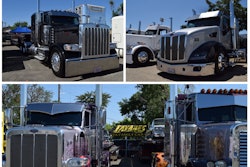The Supreme Court has denied the California Trucking Association’s petition for certiorari in the case regarding California’s AB 5 independent contractor law, putting an end to a years-long legal battle and, likely, the traditional leased owner-operator model in the state.
The law, which went into effect Jan. 1, 2020, has not applied to trucking due to an injunction issued just before the law took effect. With SCOTUS denying CTA’s request to review the case, the injunction will be lifted, and the law will apply to the trucking industry.
Greg Feary, president of transportation legal firm Scopelitis, Garvin, Light, Hanson & Feary, said the injunction will have to be lifted by a trial court, and he expects that to happen in “the next day or two.”
The California Trucking Association said in an email that the decision "will have a negative impact on the state's supply chain," adding that now that the petition has been denied, the injunction will be lifted within seven days.
“In addition to the direct impact on California’s 70,000 owner-operators who have seven days to cease long-standing independent businesses, the impact of taking tens of thousands of truck drivers off the road will have devastating repercussions on an already fragile supply chain, increasing costs and worsening runaway inflation," CTA said. "We are disappointed the Court does not recognize the irrevocable damage eliminating independent truckers will have on interstate commerce and communities across the state. The [California] legislature and [California Gov. Gavin] Newsom Administration must immediately take action to avoid worsening the supply chain crisis and inflation.”

The Western States Trucking Association was also disappointed in the Court's decision.
"Clearly, we along with most everyone else in the trucking industry are disappointed by this rejection," said Joe Rajkovacz, director of governmental affairs and communications for WSTA.
AB 5 instituted strict criteria for determining a worker’s classification status – employee or contractor – known as the ABC test. In the case of trucking, the ‘B’ prong of the ABC test effectively bars motor carriers from contracting with owner-operators, such as those who lease their equipment to a carrier and run under their authority or independent operators/fleets with their own authority that contract to haul freight for a larger carrier.
CTA filed a lawsuit against the law in late 2019, arguing the 1994 Federal Aviation Administration Authorization Act (FAAAA) preempts any state-level laws that would “interfere with prices, routes and services” of motor carriers. The 'B' prong of the test is particularly problematic for traditional leasing arrangements with owner-operators classified as independent contractors, given it requires a contractor to be outside the normal course of business of the entity contracted to.
In April 2021, California’s Ninth Circuit Court of Appeals reversed the injunction that had been in place since the law took effect, but the injunction was allowed to remain in place through CTA’s appeal to the Supreme Court.
When the injunction is lifted, Feary said the law will take effect retroactively to Jan. 1, 2020, meaning it will legally be viewed as having been in effect since that date. Effectively, any lawsuits regarding contractor status during a time period since Jan. 1, 2020, will use the ABC test to determine the worker’s status, Feary said, even though the law did not technically apply to trucking during that time.
"This rejection by the Supreme Court means any motor carrier leasing an owner-operator under federal leasing regulations in California is severely at risk; they cannot pass the ABC test," WSTA's Rajkovacz said. "Relationships involving carriers and brokers contracting with single truck operators that have incorporated and have their own operating authority will come under the microscope, too."
Rajkovacz added that the legal industry will be the biggest winner as a result of the denial.
"The only winners here will be the legal profession in my opinion, as many motor carriers and brokers will need to 'lawyer up,' and frankly for the majority of small business[es], they can’t afford the legal fees to try and defend themselves against a state determined to do the bidding of organized labor, who believe they will financially benefit by increased membership."
Rajkovacz noted that WSTA has been working with "a growing number of members" to relocate to other states due to AB 5, as well as CARB emissions rules.
"They just don't see a future here," he said. "That's likely to accelerate."
The Owner-Operator Independent Drivers Association said with AB 5 now going into effect, there is a lot of uncertainty about how independent contractors can operate in California.
"California has provided no guidance to owner-operators about how they can work as independent contractors under this new scheme, and truckers will be at the mercy of the courts to interpret how the law will be applied," OOIDA said in a statement. "For truckers that have invested their blood, sweat and treasure to create their own businesses, it is dismaying that lawmakers and the courts are forging ahead with this radical policy that dismisses a beneficial business model that has been in place for decades. At the same time, we know this will not be last word on the legality of AB 5 and expect to participate in future challenges to the law."
In addition to CTA, the American Trucking Associations, OOIDA, WSTA and a number of other groups were all part of the lawsuit fighting AB 5.
The International Brotherhood of Teamsters is not among those disappointed with SCOTUS refusal of hear CTA's argument, calling it "a significant victory in the Teamsters' decades-long battle against misclassification in trucking," said Jason Rabinowitz, president of Teamsters Joint Council 7.
"Finally, port truck drivers and so many others across California will have the opportunity to join together and earn a fair wage that allows them to support their families," added Teamsters General President Sean M. O'Brien. "These companies can no longer take advantage of workers and fill their own executive pockets with unfairly earned profits."
This is a developing story. Please check back for updates as they come available.










